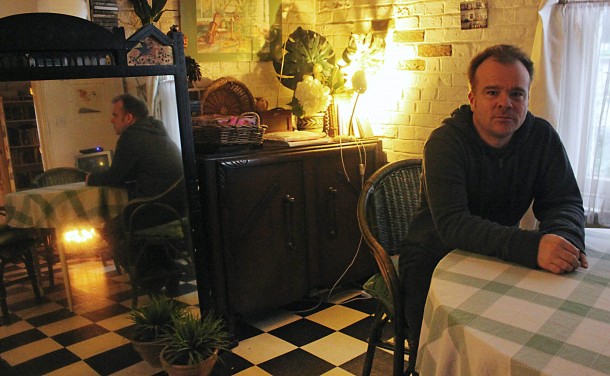
Some of Lambeth’s more desirable properties, including historic cottages in Clapham’s Old Town, have since the late 1970s been home to “shortlife” tenants. The residents pay low rents – in some cases, £10 a week – but are responsible for the costs of maintaining the houses themselves.
However, the arrangement is under threat, as Lambeth council is selling the houses at auction – which, in some cases, means evicting tenants. The council claims the money will be used to refurbish other social housing.
In the third of a Brixton Blog and Bugle series on the residents of ‘shortlife’ housing, politics editor Kaye Wiggins meets Jules Hall at his house in Clapham’s old town.
He lives there with his partner Sarah and their cats, Monica and Anya.
I’ve lived here since 2003, but I knew this house before I moved in. The lady who lived here before me was a friend of a friend through university.
Her circumstances changed for the better financially, so she was able to move and get her own place. She felt it was no longer appropriate to be here, she didn’t need to be.
She suggested that I should move in, because at the time I was having financial difficulties. I’d done a course to try and change my job and it hadn’t worked out and it left me quite heavily in debt.
Being in the house has helped to stabilise things and bring some balance to my life, to avoid having to start from scratch.
I work from home as a freelance writer, so the house is where I work and live, it’s everything. The rent is a nominal fee of £10 a week but the onus is on us to repair and maintain the houses.
I’ve really enjoyed looking after the property and doing it up, putting in central heating and fixing the window frames which were quite rotten.
It’s hard to quantify how much I’ve spent on it over the past decade but I suppose it’s around £10,000. It’s been a labour of love.
More recently my partner Sarah has moved in with me. She’d tell you there are three people in the relationship – me, her and the house. And the cats, of course.
The sanctity of your home is a key thing for me, and that’s what’s under threat here [from the council’s plan to remove short-life tenants from their homes and sell the houses at auction].
It was a few years after I moved in, probably about 2007, that the eviction threat really resurfaced. I think before that there’d been a feeling that because it had got past the 30 year marker [of shortlife tenants occupying the houses] it would become impractical for the council to effectively move on people.
The real D-day was early last year, when I realised things had hit the fan. My way of dealing with that was to go headlong into campaigning to let us stay in our homes.
When they get sold off, these houses become decharacterised. We call the house at the end of our road ‘bleach house’ because literally they’ve bleached the outside of the house.
The character has leaked out of it really. I’m worried that the developers don’t or won’t respect the period features.
When people like Cllr Pete Robbins say ‘none of these shortlife people have paid rent’ I think, yeah, who to? Because actually it’s the council who would make those arrangements.
And Lambeth council wanted no meaningful financial relationship with shortlife. Because if we’d paid Lambeth any money, that would’ve made us tenants which would’ve been a much better outcome [for us].
I don’t really know how much it would cost to rent this house. On social rent it might be £100 to £150 per week, or a market rent is going to be over £200 a week.
The shortlife tenants have proposed an alternative to the council’s plan called the ‘super coop’. It would let me pass this house on to someone on the council’s housing waiting list, and that would please me immensely.
But the fact it’s being sold for hundreds of thousands as part of gentrification doesn’t please me.
If our plan fails, the council will rehouse us in social housing. In other circumstances I don’t think I would be eligible for social housing. But I certainly didn’t ask to queue jump, that wasn’t the intention of being here. I would much rather stay in the home I already have.
If the council sets a precedent of raising money to add to their coffers through the eviction of long term residents of the borough, I think that is very dangerous. What will they do next?







If these are the properties in rectory gardens SW4, they do have great character but a great many of those properties look quite derelict and uncared for. I’m not suggesting bleaching the front of the houses but bringing them up to decent standard would be great and even saving their period features would be a bonus but one suspects that Lambeth hasn’t got the money for that and so would rather sell them off. It’s a catch 22 situation as the residents barely pay rent in an area that is most unaffordable to most Londoners. I think Lambeth is caught between the devil and the deep blue sea, with funding cuts, for instance, it has sold off its historic properties in Brixton not only to meet its shortfall of cash but also to fuel the appetite for regeneration there, so that Brixton is fast losing its old ‘alternative’ character to becoming an ersatz semi-gentrified playground of sorts filled with chain shops and restaurants. It’s only a matter of time before the original micro restaurants of Brixton village are replaced by chains wanting to take advantage of newly discovered tube and bust footfall and Clapham-type youngsters shifting their party base over there. btw someone commented that Brixton is fast becoming like Shoreditch, that is a laugh because once upon a time Brixton with all its advantages and disadvantages stood head and shoulder above any other area with it’s uniqueness, so it is surprising that the area is has been turned into a wanna be Hackney or wanna be Dalston
[…] United Housing Co-Op spokesman, Julian Hall, told the Blog: The money raised so far is £8m in excess of the target Lambeth set themselves, but […]
10 pounds a week in Clapham Old Town, no wonder they are protesting about being evicted! I think that amount is taking the xxxx*. That has been a gift, for a very long time by the sounds of things.
Ironically, these short-life homes are probably in better condition than the council’s own social housing, of which the council is now claiming 40-50% are not decent despite collecting rents for the past 40 years.
One hundred percent support for Jules Hall and all the other residents of these “short-life” houses in Clapham.
That little bit of Clapham Old Town is a jewel, real community with real community art in a part of London that is experiencing the socially corrosive effects of the property price madness more than most.
I love how he describes this effect, his phrase “bleach” house is perfect. I live in the area and I see it happening to houses all around me, they are gutted, scrubbed up, their front gardens turned into car-parks, all the lives that have been lived in them over the past 100 years blotted out.
These short-lifers offer a real example of an alternative approach to living in the city. All I can think to say is shame on Lambeth for even thinking of destroying what they themselves helped to foster back in the 1970s.
This place needs the social equivalent of a Grade 1 listing.
You short-life residents, you are pure gold, all strength to you.